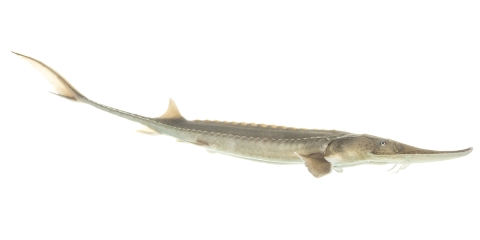Overview
Pallid sturgeon are prehistoric. The sturgeon family has been in existence since the Cretaceous time period, about 70 million years ago. They do not have skeletons made of bones like most other fish, but instead, pallid sturgeon have a cartilage skeleton, just like sharks. They like deep, swift moving and murky water. When young, they eat aquatic insects, but after growing larger and older, they primarily eat other small and large fish.
Scientific Name
Identification Numbers
Characteristics
Habitat
Adult pallid sturgeon inhabit large, deep turbid river channels, usually in strong current over firm sand or gravel.
Food
Pallid sturgeon feed on immature aquatic insect larvae and small fish.
Physical Characteristics
Pallid sturgeon can weigh around 80 pounds.
Pallid sturgeon can grow up to 6 feet long! They have a dinosaur-like appearance and have a long flat head. Their body has rows of hard, bony plates called scutes instead of scales. Their tail is long and slender. Their mouth doesn’t have teeth and acts like a vacuum to suck up prey.
Life Cycle
Pallid sturgeon live a long time and grow to be quite large. Research shows that they can live up to at least 80 years old, maybe more.
When pallid sturgeon are ready to spawn, they can migrate 100 miles or more to reproduce. Females usually spawn every two years while males spawn almost every year after reaching maturity. Males mature at about 5 to 10 years old while females will not mature until about 15 to 20 years old. If spawning and egg hatch is successful, their larvae, or newly hatched fish, drift down the river for about seven days for many, sometimes hundreds, of miles. After that, they settle down to eat and grow.
Behavior
Migration Behavior
Pallid sturgeon are a migratory species. They move throughout the Missouri and Mississippi river systems and are built for migrating through swift flowing, muddy water. They also have the ability to move through brackish water where freshwater and salt water mix together.
Geography
Pallid sturgeon inhabit large rivers, primarily the Missouri and Mississippi rivers. They like deep, swift moving and murky water.
Timeline
Explore the information available for this taxon's timeline. You can select an event on the timeline to view more information, or cycle through the content available in the carousel below.
10 Items
